

However normal aging is not responsible for causing memory disorder but is related with a general decline in cognitive and neural systems, including memory.
Then does forgetfulness imply anything else?
Do Memory Problems Always Mean Alzheimer's Disease?
Many people worry about becoming forgetful.
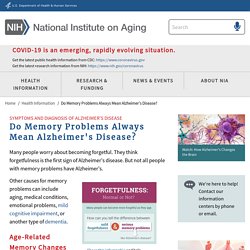
They think forgetfulness is the first sign of Alzheimer's disease. Age-Related Memory Loss: What's Normal, What's Not, and When to Seek Help. Worried about your forgetfulness? Learn what’s normal when it comes to memory and aging, and how to recognize the signs of more serious problems. Memory and aging We’ve all misplaced keys, blanked on someone’s name, or forgotten a phone number.
When you’re young, you don’t tend to pay much attention to these lapses, but as you grow older, you may worry about what they mean. Perhaps you start to talk about a movie you saw recently when you realize you can’t remember the title. As you grow older, you experience physiological changes that can cause glitches in brain functions you’ve always taken for granted. Age-related memory loss The brain is capable of producing new brain cells at any age, so significant memory loss is not an inevitable result of aging. Symptoms, Diagnosis, Causes, Treatments. Dementia: Stages, Causes, Symptoms, and Treatments. What Is Dementia?
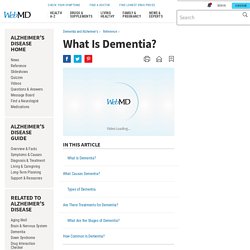
Dementia causes problems with thinking, memory, and reasoning. It happens when the parts of the brain used for learning, memory, decision making, and language are damaged or diseased. Memory Loss & Forgetfulness: Causes, Symptoms, Treatments. Many older people worry about becoming more forgetful.
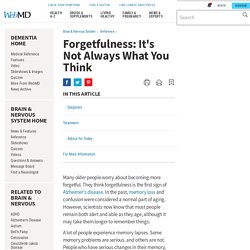
They think forgetfulness is the first sign of Alzheimer's disease. In the past, memory loss and confusion were considered a normal part of aging. However, scientists now know that most people remain both alert and able as they age, although it may take them longer to remember things. A lot of people experience memory lapses. Some memory problems are serious, and others are not.
The term dementia describes a group of symptoms that are caused by changes in brain function. Sometimes older people have emotional problems that can be mistaken for dementia. Cognitive Skills & Normal Aging. Normal Amount of Cognitive Decline A commonly held misconception is that aging results in an inevitable loss of all cognitive abilities and that nothing can be done to halt this decline.
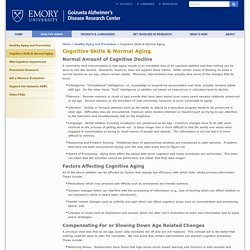
Research, however, does not support these claims. While certain areas of thinking do show a normal decline as we age, others remain stable. Moreover, interventions may actually slow some of the changes that do occur. Intelligence: “Chrystalized” intelligence, i.e., knowledge or experience accumulated over time, actually remains stable with age. Factors Affecting Cognitive Aging. Age Associated Memory Impairment - Memory Disorders - The Human Memory. Age associated memory impairment is a label for the general degradation of memory which results from ageing.
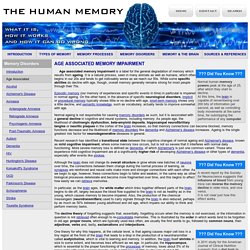
It is a natural process, seen in many animals as well as humans, which often begins in our 20s and tends to get noticeably worse as we reach our 50s. While some specific abilities do decline with age, though, overall memory generally remains strong for most people through their 70s. Episodic memory (our memory of experiences and specific events in time) in particular is impaired in normal ageing. What is Alzheimer's. Alzheimer's disease is a type of dementia that causes problems with memory, thinking and behavior. Symptoms usually develop slowly and get worse over time, becoming severe enough to interfere with daily tasks. Subscribe to our e-newsletter to learn how you can help those affected by Alzheimer's. Vascular dementia. Overview Vascular dementia is a general term describing problems with reasoning, planning, judgment, memory and other thought processes caused by brain damage from impaired blood flow to your brain.
You can develop vascular dementia after a stroke blocks an artery in your brain, but strokes don't always cause vascular dementia. Whether a stroke affects your thinking and reasoning depends on your stroke's severity and location. Vascular dementia can also result from other conditions that damage blood vessels and reduce circulation, depriving your brain of vital oxygen and nutrients. Factors that increase your risk of heart disease and stroke — including diabetes, high blood pressure, high cholesterol and smoking — also raise your vascular dementia risk.
Symptoms Vascular dementia symptoms vary, depending on the part of your brain where blood flow is impaired. Parkinson's Disease Dementia. Parkinson's disease dementia is an impairment in thinking and reasoning that eventually affects many people with Parkinson's disease.
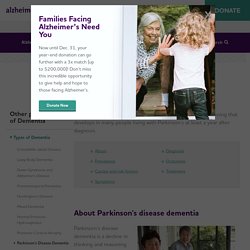
About Parkinson's disease dementia The brain changes caused by Parkinson's disease begin in a region that plays a key role in movement. As Parkinson's brain changes gradually spread, they often begin to affect mental functions, including memory and the ability to pay attention, make sound judgments and plan the steps needed to complete a task. Dementia with Lewy Bodies (DLB) Dementia with Lewy bodies (DLB) is a type of progressive dementia that leads to a decline in thinking, reasoning and independent function because of abnormal microscopic deposits that damage brain cells over time.
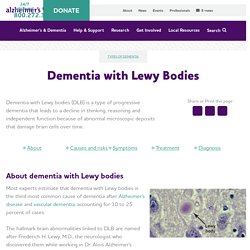
About dementia with Lewy bodies Most experts estimate that dementia with Lewy bodies is the third most common cause of dementia after Alzheimer's disease and vascular dementia, accounting for 10 to 25 percent of cases. The hallmark brain abnormalities linked to DLB are named after Frederich H. Lewy, M.D., the neurologist who discovered them while working in Dr. Frontotemporal Dementia (FTD) Frontotemporal dementia (FTD) or frontotemporal degenerations refers to a group of disorders caused by progressive nerve cell loss in the brain's frontal lobes (the areas behind your forehead) or its temporal lobes (the regions behind your ears).
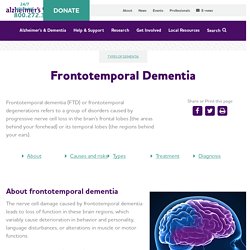
About frontotemporal dementia The nerve cell damage caused by frontotemporal dementia leads to loss of function in these brain regions, which variably cause deterioration in behavior and personality, language disturbances, or alterations in muscle or motor functions. There are a number of different diseases that cause frontotemporal degenerations. The two most prominent are 1) a group of brain disorders involving the protein tau and 2) a group of brain disorders involving the protein called TDP43. Creutzfeldt-Jakob disease. A major cause of age-related memory loss identified: Potentially reversible.
A team of Columbia University Medical Center (CUMC) researchers, led by Nobel laureate Eric R.
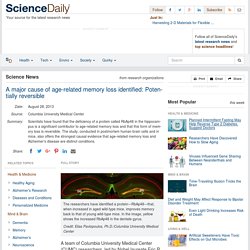
Kandel, MD, has found that deficiency of a protein called RbAp48 in the hippocampus is a significant contributor to age-related memory loss and that this form of memory loss is reversible. The study, conducted in postmortem human brain cells and in mice, also offers the strongest causal evidence that age-related memory loss and Alzheimer's disease are distinct conditions. The findings were published today in the online edition of Science Translational Medicine.
Can dementia be prevented? There's no certain way to prevent all types of dementia – researchers are still investigating how the disease develops.
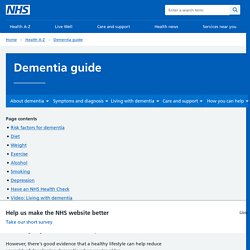
However, there's good evidence that a healthy lifestyle can help reduce your risk of developing dementia when you're older. It can also help prevent cardiovascular diseases, such as stroke and heart attacks, which are themselves risk factors for Alzheimer's disease and vascular dementia, the most common types of dementia. Risk factors for dementia A risk factor is something that increases your likelihood of developing a condition. Some dementia risk factors are difficult or impossible to change. Age: the older you are, the more likely you are to develop dementia. In addition, the latest research suggests that other factors are also important. Alzheimer's & Dementia Prevention. Can Alzheimer's be prevented? It's a question that continues to intrigue researchers and fuel new investigations.
There are no clear-cut answers yet — partially due to the need for more large-scale studies in diverse populations — but promising research is under way. The Alzheimer's Association® is leading the worldwide effort to find a treatment for Alzheimer's, delay its onset and prevent it from developing. What causes Alzheimer’s? Prevention studies A small percentage of people with Alzheimer’s disease (less than 1 percent) have an early-onset type associated with genetic mutations.
Another clinical trial, known as the A4 trial (Anti-Amyloid Treatment in Asymptomatic Alzheimer’s), is testing whether antibodies to beta-amyloid can reduce the risk of Alzheimer’s disease in older people (ages 65 to 85) at high risk for the disease. Heart–head connection. Caregiver’s Guide to Understanding Dementia Behaviors. Dementia Care Dos and Don'ts: Dealing with Dementia.
What to do if you've just been diagnosed with dementia. If you've just been diagnosed with dementia, you may be feeling numb, scared and unable to take everything in. Give yourself a little time to adjust. If you can, talk to family and friends about your feelings around a dementia diagnosis. Once the initial feelings have passed, it's time to try to move on and create an action plan for the future, while you're still able to make clear decisions for yourself.
Get assessed Your local authority has a duty to carry out a care and support needs assessment to establish which services you may need. Find out more about how to get an assessment for a person with dementia.